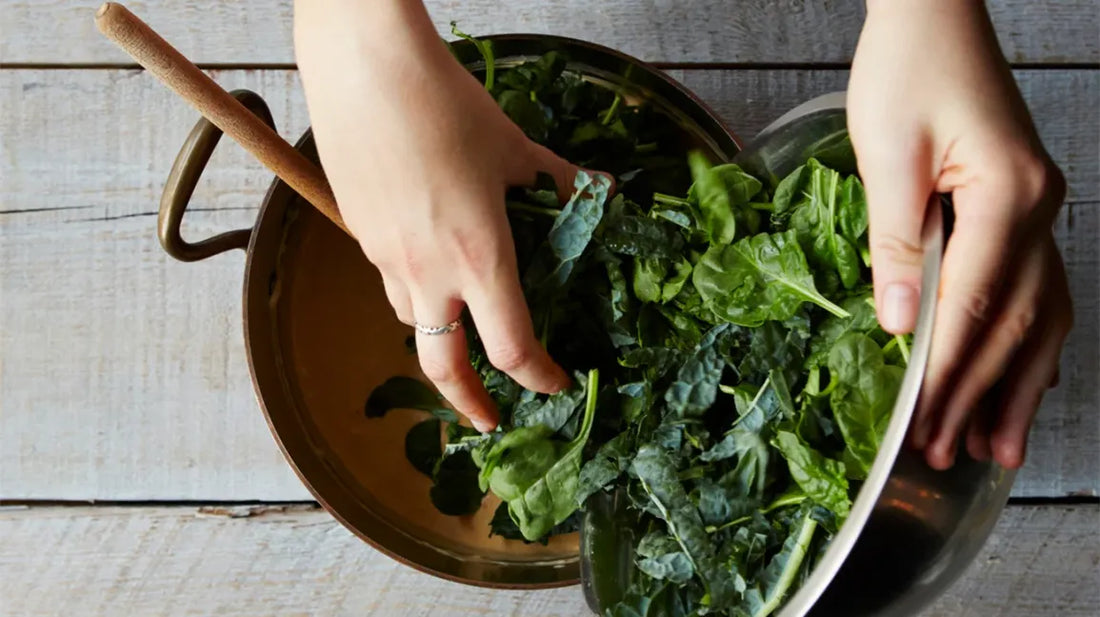Persistent inflammation can lead to a variety of health problems, such as diabetes, arthritis, and heart disease, even though the body naturally produces inflammation in response to injury or infection. Many people use diet to control inflammation, and spinach is often mentioned as a powerful anti-inflammatory vegetable. But why is spinach such a potent anti-inflammatory? Its unique combination of nutrients and bioactive compounds, which work together to combat the body's inflammatory processes, is the answer. This article will go over the primary components of spinach that reduce inflammation, how they work, and why eating spinach can improve your overall health.
What Nutrients in Spinach Are Known for Their Anti-Inflammatory Properties?
Numerous vitamins, minerals, and phytochemicals found in spinach are known to have anti-inflammatory properties. Rich in:
1. Beta-carotene, a form of vitamin A, combined with vitamin K
2. The magnesium and vitamin C
3. Flavonoids and carotenoids (such as lutein and zeaxanthin)
4. Folate
Each of these nutrients plays a unique role in reducing inflammation and protecting cells from oxidative stress, which is the main source of chronic inflammation.
How Does Vitamin K in Spinach Help Reduce Inflammation?
Spinach contains vitamin K, which reduces inflammation by regulating the activity of proteins involved in the inflammatory response. Vitamin K is required to activate certain proteins that inhibit inflammatory cytokines, which are molecules that promote inflammation. Studies have shown that consuming more vitamin K is associated with lower levels of inflammatory markers, such as C-reactive protein (CRP). As a result, spinach is a fantastic source of vitamin K, which contributes to some of its anti-inflammatory qualities.
Why Is Vitamin A Important for Fighting Inflammation in Spinach?
Beta-carotene, the main form of vitamin A found in spinach, is a strong antioxidant that is essential for lowering inflammation. Unstable molecules known as free radical’s damage cells and cause oxidative stress, which leads to inflammation. These molecules are counteracted by antioxidants. Beta-carotene also helps the body better regulate inflammatory responses by fortifying the immune system. Consuming spinach on a regular basis ensures a healthy supply of vitamin A, which promotes skin, eye, and immunological health while reducing inflammation.
What Role Does Vitamin C Play in Spinach’s Anti-Inflammatory Effects?
Vitamin C is crucial for spinach's anti-inflammatory qualities because it is a potent antioxidant and boosts immunity. It reduces oxidative stress by scavenging free radicals and restoring other antioxidants in the body. Additionally, vitamin C encourages the production of collagen, which is necessary for wound healing and the reduction of inflammation. Spinach is a good food for naturally lowering inflammation because of its high vitamin C content.
How Does Magnesium in Spinach Contribute to Reducing Inflammation?
Spinach contains magnesium, which helps to lower inflammation by regulating inflammatory pathways and enhancing muscle and nerve function. Low magnesium levels have been linked to increased inflammation and elevated levels of inflammatory markers. Magnesium helps to modulate the immune response and reduces the production of pro-inflammatory cytokines. Eating foods high in magnesium, like spinach, can help you keep your inflammatory levels in check and promote overall health.
What Are Flavonoids and Carotenoids in Spinach, and How Do They Reduce Inflammation?
Flavonoids and carotenoids, like lutein and zeaxanthin, are powerful plant compounds with anti-inflammatory and antioxidant qualities that reduce inflammation. They are found in spinach. By inhibiting the activities of inflammatory enzymes, these phytochemicals protect cells from oxidative damage. Studies have connected diets rich in flavonoids and carotenoids to a lower risk of chronic inflammatory diseases. Spinach is a powerful natural anti-inflammatory because it is one of the best sources of these compounds.
How Does Folate in Spinach Help in Inflammation Control?
Folate in spinach helps control inflammation by encouraging DNA synthesis and repair, both of which are essential for healthy cell function. Furthermore, folate helps control the levels of homocysteine, an amino acid that, in excess, can cause inflammation and increase the risk of cardiovascular diseases. Consuming spinach to maintain adequate folate levels can help the body better regulate inflammatory processes and reduce the risk of disorders related to inflammation.
What Is the Overall Impact of Spinach Nutrients on Inflammation?
Spinach nutrients have a significant overall effect on inflammation due to the synergistic effects of vitamins, minerals, and phytochemicals. These nutrients
· Oxidative stress can be reduced by getting rid of free radicals.
· Regulate inflammatory cytokines and enzymes; improve the function of the immune system
· Promote normal cell activity and tissue healing.
Together, these practices help lower chronic inflammation, which is linked to several modern diseases.
Should You Eat Raw or Cooked Spinach for Maximum Anti-Inflammatory Benefits?
Yes! Both raw and cooked spinach have anti-inflammatory properties, but cooking changes the bioavailability of some of these compounds. For example:
- Cooking spinach increases the availability of several antioxidants, including beta-carotene and lutein.
- However, cooking can reduce the amount of heat-sensitive vitamin C. Vitamin K and folate levels remain relatively stable while cooking.
- For maximum benefits, include both raw and mildly cooked spinach in your diet. This approach ensures that you get a variety of nutrients that lower inflammation.
How Much Spinach Should You Eat to Benefit from Its Anti-Inflammatory Nutrients?
In general, consuming one to two cups of fresh spinach daily can provide you with a substantial quantity of the vital nutrients needed to reduce inflammation. This amount easily fits into a balanced diet and is added to cooked meals, smoothies, and salads. Remember that variety is essential, so adding other inflammatory-lowering foods to spinach boosts its overall health benefits.
Table of Summary: Key Spinach Anti-Inflammatory Ingredients and Their Benefits
|
Nutrient |
Role in Reducing Inflammation |
Spinach Content (per 100g) |
|
Vitamin K |
Regulates inflammatory proteins |
483 µg (over 400% Daily Value) |
|
Vitamin A (Beta-carotene) |
Antioxidant, immune support |
469 µg RAE |
|
Vitamin C |
Antioxidant, collagen synthesis |
28 mg (about 31% Daily Value) |
|
Magnesium |
Modulates immune response |
79 mg (20% Daily Value) |
|
Flavonoids/Carotenoids |
Antioxidant, enzyme inhibition |
Variable, high levels |
|
Folate |
DNA repair, homocysteine regulation |
194 µg (49% Daily Value) |
This table lists the primary anti-inflammatory components of spinach, their roles, and an estimate of their concentrations per 100 grams of raw spinach.
Why Spinach Is a Natural Ally Against Inflammation?
More than just a leafy green, spinach is a natural ally against inflammation due to its complex nutritional profile. Magnesium, folate, vitamin K, vitamin A, vitamin C, and powerful phytochemicals like flavonoids and carotenoids work together to reduce oxidative stress, regulate inflammation, and strengthen the immune system.
It all depends on consistency, consuming spinach on a regular basis can help manage chronic inflammation and lower your risk of developing several inflammatory-related disorders. Whether eaten raw or cooked, spinach is a delicious and nutrient-dense way to boost your body's defenses and promote long-term health. The next time you're cooking, remember that a handful of spinach is a simple yet powerful step toward a healthy, inflammation-free life.

